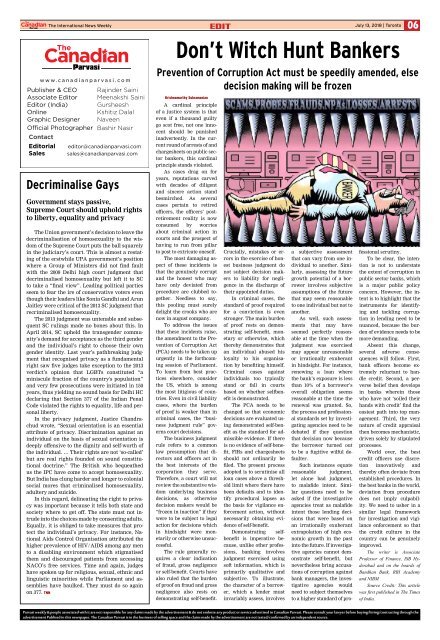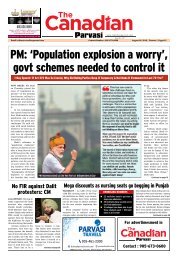You also want an ePaper? Increase the reach of your titles
YUMPU automatically turns print PDFs into web optimized ePapers that Google loves.
EDIT<br />
<strong>The</strong> International News Weekly July 13, 2018 | Toronto 06<br />
<strong>The</strong><br />
w w w . canadianparv asi. c o m<br />
Publisher & CEO<br />
Associate Editor<br />
Editor (India)<br />
Online<br />
Graphic Designer<br />
Official Photographer<br />
Contact<br />
Editorial<br />
Sales<br />
Rajinder Saini<br />
Meenakshi Saini<br />
Gursheesh<br />
Kshitiz Dalal<br />
Naveen<br />
Bashir Nasir<br />
editor@canadianparvasi.com<br />
sales@canadianparvasi.com<br />
Decriminalise Gays<br />
Government stays passive,<br />
Supreme Court should uphold rights<br />
to liberty, equality and privacy<br />
<strong>The</strong> Union government’s decision to leave the<br />
decriminalisation of homosexuality to the wisdom<br />
of the Supreme Court puts the ball squarely<br />
in the judiciary’s court. This is almost a restating<br />
of the erstwhile UPA government’s position<br />
where a Group of Ministers did not find fault<br />
with the 2009 Delhi high court judgment that<br />
decriminalised homosexuality but left it to SC<br />
to take a “final view”. Leading political parties<br />
seem to fear the ire of conservative voters even<br />
though their leaders like Sonia Gandhi and Arun<br />
Jaitley were critical of the 2013 SC judgment that<br />
recriminalised homosexuality.<br />
<strong>The</strong> 2013 judgment was untenable and subsequent<br />
SC rulings made no bones about this. In<br />
April 2014, SC upheld the transgender community’s<br />
demand for acceptance as the third gender<br />
and the individual’s right to choose their own<br />
gender identity. Last year’s pathbreaking judgment<br />
that recognised privacy as a fundamental<br />
right saw five judges take exception to the 2013<br />
verdict’s opinion that LGBTs constituted “a<br />
miniscule fraction of the country's population”<br />
and very few prosecutions were initiated in 150<br />
years, thus yielding no sound basis for Delhi HC<br />
declaring that Section 377 of the Indian Penal<br />
Code violated the rights to equality, life and personal<br />
liberty.<br />
In the privacy judgment, Justice Chandrachud<br />
wrote, “Sexual orientation is an essential<br />
attribute of privacy. Discrimination against an<br />
individual on the basis of sexual orientation is<br />
deeply offensive to the dignity and self-worth of<br />
the individual. … <strong>The</strong>ir rights are not ‘so-called’<br />
but are real rights founded on sound constitutional<br />
doctrine.” <strong>The</strong> British who bequeathed<br />
us the IPC have come to accept homosexuality.<br />
But India has clung harder and longer to colonial<br />
social mores that criminalised homosexuality,<br />
adultery and suicide.<br />
In this regard, delineating the right to privacy<br />
was important because it tells both state and<br />
society where to get off. <strong>The</strong> state must not intrude<br />
into the choices made by consenting adults.<br />
Equally, it is obliged to take measures that protect<br />
the individual’s privacy. For instance, National<br />
Aids Control Organisation attributed the<br />
higher prevalence of HIV/AIDS among gay men<br />
to a disabling environment which stigmatised<br />
them and discouraged patients from accessing<br />
NACO’s free services. Time and again, judges<br />
have spoken up for religious, sexual, ethnic and<br />
linguistic minorities while Parliament and assemblies<br />
have baulked. <strong>The</strong>y must do so again<br />
on 377. TNN<br />
Don’t Witch Hunt Bankers<br />
Prevention of Corruption Act must be speedily amended, else<br />
decision making will be frozen<br />
Krishnamurthy Subramanian<br />
A cardinal principle<br />
of a justice system is that<br />
even if a thousand guilty<br />
go scot free, not one innocent<br />
should be punished<br />
inadvertently. In the current<br />
round of arrests of and<br />
chargesheets on public sector<br />
bankers, this cardinal<br />
principle stands violated.<br />
As cases drag on for<br />
years, reputations carved<br />
with decades of diligent<br />
and sincere action stand<br />
besmirched. As several<br />
cases pertain to retired<br />
officers, the officers’ postretirement<br />
reality is now<br />
consumed by worries<br />
about criminal action in<br />
courts and the prospect of<br />
having to run from pillar<br />
to post to extricate oneself.<br />
<strong>The</strong> most damaging aspect<br />
of these incidents is<br />
that the genuinely corrupt<br />
and the honest who may<br />
have only deviated from<br />
procedure are clubbed together.<br />
Needless to say,<br />
this pooling must surely<br />
delight the crooks who are<br />
now in august company.<br />
To address the <strong>issue</strong>s<br />
that these incidents raise,<br />
the amendment to the Prevention<br />
of Corruption Act<br />
(PCA) needs to be taken up<br />
urgently in the forthcoming<br />
session of Parliament.<br />
To learn from best practices<br />
elsewhere, consider<br />
the US, which is among<br />
the most litigious of countries.<br />
Even in civil liability<br />
cases, where the burden<br />
of proof is weaker than in<br />
criminal cases, the “business<br />
judgment rule” governs<br />
court decisions.<br />
<strong>The</strong> business judgment<br />
rule refers to a common<br />
law presumption that directors<br />
and officers act in<br />
the best interests of the<br />
corporation they serve.<br />
<strong>The</strong>refore, a court will not<br />
review the substantive wisdom<br />
underlying business<br />
decisions, as otherwise<br />
decision makers would be<br />
“frozen in inaction” if they<br />
were to be subject to legal<br />
action for decisions which<br />
in hindsight were monetarily<br />
or otherwise unsuccessful.<br />
<strong>The</strong> rule generally requires<br />
a clear indication<br />
of fraud, gross negligence<br />
or self-benefit. Courts have<br />
also ruled that the burden<br />
of proof on fraud and gross<br />
negligence also rests on<br />
demonstrating self-benefit.<br />
Crucially, mistakes or errors<br />
in the exercise of honest<br />
business judgment do<br />
not subject decision makers<br />
to liability for negligence<br />
in the discharge of<br />
their appointed duties.<br />
In criminal cases, the<br />
standard of proof required<br />
for a conviction is even<br />
stronger. <strong>The</strong> main burden<br />
of proof rests on demonstrating<br />
self-benefit, monetary<br />
or otherwise, which<br />
thereby demonstrates that<br />
an individual abused his<br />
loyalty to his organisation<br />
by benefiting himself.<br />
Criminal cases against<br />
individuals too typically<br />
stand or fall in courts<br />
based on whether selfbenefit<br />
is demonstrated.<br />
<strong>The</strong> PCA needs to be<br />
changed so that economic<br />
decisions are evaluated using<br />
demonstrated self-benefit<br />
as the standard for admissible<br />
evidence. If there<br />
is no evidence of self-benefit,<br />
FIRs and chargesheets<br />
should not ordinarily be<br />
filed. <strong>The</strong> present process<br />
adopted is to scrutinise all<br />
loan cases above a threshold<br />
limit where there have<br />
been defaults and to identify<br />
procedural lapses as<br />
the basis for vigilance enforcement<br />
action, without<br />
necessarily obtaining evidence<br />
of self-benefit.<br />
Demonstrating selfbenefit<br />
is imperative because,<br />
unlike other professions,<br />
banking involves<br />
judgment exercised using<br />
soft information, which is<br />
primarily qualitative and<br />
subjective. To illustrate,<br />
the character of a borrower,<br />
which a lender must<br />
invariably assess, involves<br />
a subjective assessment<br />
that can vary from one individual<br />
to another. Similarly,<br />
assessing the future<br />
growth potential of a borrower<br />
involves subjective<br />
assumptions of the future<br />
that may seem reasonable<br />
to one individual but not to<br />
another.<br />
As well, such assessments<br />
that may have<br />
seemed perfectly reasonable<br />
at the time when the<br />
judgment was exercised<br />
may appear unreasonable<br />
or irrationally exuberant<br />
in hindsight. For instance,<br />
renewing a loan where<br />
the bank’s exposure is less<br />
than 10% of a borrower’s<br />
overall obligation seems<br />
reasonable at the time the<br />
renewal was granted. So,<br />
the process and professional<br />
standards set by investigating<br />
agencies need to be<br />
debated if they question<br />
that decision now because<br />
the borrower turned out<br />
to be a fugitive wilful defaulter.<br />
Such instances equate<br />
reasonable judgment,<br />
let alone bad judgment,<br />
to malafide intent. Similar<br />
questions need to be<br />
asked if the investigative<br />
agencies treat as malafide<br />
intent those lending decisions<br />
that were based on<br />
an irrationally exuberant<br />
extrapolation of high economic<br />
growth in the past<br />
into the future. If investigative<br />
agencies cannot demonstrate<br />
self-benefit, but<br />
nevertheless bring accusations<br />
of corruption against<br />
bank managers, the investigative<br />
agencies would<br />
need to subject themselves<br />
to a higher standard of professional<br />
scrutiny.<br />
To be clear, the intention<br />
is not to understate<br />
the extent of corruption in<br />
public sector banks, which<br />
is a major public policy<br />
concern. However, the intent<br />
is to highlight that the<br />
instruments for identifying<br />
and tackling corruption<br />
in lending need to be<br />
nuanced, because the burden<br />
of evidence needs to be<br />
more demanding.<br />
Absent this change,<br />
several adverse consequences<br />
will follow. First,<br />
bank officers become extremely<br />
reluctant to handle<br />
credit. Second, a perverse<br />
belief then develops<br />
in banks wherein those<br />
who have not ‘soiled their<br />
hands with credit’ find the<br />
easiest path into top management.<br />
Third, the very<br />
nature of credit appraisal<br />
then becomes mechanistic,<br />
driven solely by stipulated<br />
processes.<br />
World over, the best<br />
credit officers use discretion<br />
innovatively and<br />
thereby often deviate from<br />
established procedures. In<br />
the best banks in the world,<br />
deviation from procedure<br />
does not imply culpability.<br />
We need to usher in a<br />
similar legal framework<br />
for investigation and vigilance<br />
enforcement so that<br />
the credit culture in the<br />
country can be genuinely<br />
improved.<br />
<strong>The</strong> writer is Associate<br />
Professor of Finance, ISB Hyderabad<br />
and on the boards of<br />
Bandhan Bank, RBI Academy<br />
and NIBM<br />
Source Credit: This article<br />
was first published in <strong>The</strong> Times<br />
of India.<br />
<strong>Parvasi</strong> weekly & people associated with it are not responsible for any claims made by the advertisement & do not endorse any product or service advertised in <strong>Canadian</strong> <strong>Parvasi</strong>. Please consult your lawyer before buying/hiring/contracting through the<br />
advertisement Publised in this newspaper. <strong>The</strong> <strong>Canadian</strong> <strong>Parvasi</strong> is in the business of selling space and the clains made by the advertisement are not tested/confirmed by an independent source.

















